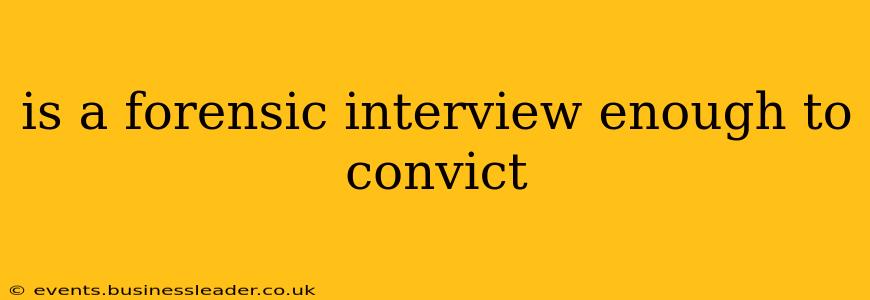Is a Forensic Interview Enough to Convict? The Crucial Role of Evidence in Criminal Cases
A forensic interview, while a vital tool in criminal investigations, is never enough on its own to secure a conviction. It's a crucial piece of the puzzle, but just one piece among many required to build a strong, legally sound case. This article will explore the role of forensic interviews in the legal process and explain why they must be supported by other forms of evidence.
What is a Forensic Interview?
A forensic interview is a structured conversation conducted by a trained professional with a child or vulnerable adult who may have been a victim of abuse or witnessed a crime. The goal is to obtain a detailed account of the event(s) in a way that minimizes trauma and maximizes the accuracy and reliability of the information gathered. These interviews employ specific techniques to avoid leading questions and encourage the individual to freely recount their experience.
Why a Forensic Interview Alone Isn't Sufficient for Conviction
Several reasons explain why a forensic interview, no matter how well-conducted, cannot lead to a conviction on its own:
-
Hearsay Evidence: Statements made during a forensic interview are considered hearsay unless the witness testifies in court. While exceptions to the hearsay rule exist for child victims, the interview itself isn't admissible as direct evidence. The interviewer would need to testify, and the accused has the right to cross-examine them and the alleged victim.
-
Lack of Corroborating Evidence: A single account, even a detailed one obtained during a forensic interview, lacks the weight of multiple forms of evidence. Prosecutors need corroborating evidence such as physical evidence (DNA, fingerprints, weapons), witness testimonies, medical records, and digital evidence to build a robust case.
-
Potential for Bias or Misinterpretation: While forensic interviewers are trained to minimize bias, human error is always a possibility. The interviewer's phrasing, body language, or even the environment can inadvertently influence the child's response. The defense will always scrutinize the interview process to explore potential flaws.
-
The Need for Legal Standards: The legal system relies on a high burden of proof, usually “beyond a reasonable doubt.” A single forensic interview, even if compelling, rarely meets this standard alone. Multiple sources of credible evidence are necessary to convince a jury or judge of guilt.
What Other Evidence is Necessary?
A successful prosecution generally requires a combination of the following:
- Physical Evidence: This includes any tangible items related to the crime, such as weapons, clothing, DNA samples, or trace evidence.
- Witness Testimony: Statements from individuals who witnessed the crime or have relevant information.
- Expert Testimony: Input from specialists like forensic scientists, medical professionals, or psychologists.
- Documentary Evidence: Relevant documents, such as medical records, financial records, or digital communications.
How Does a Forensic Interview Fit into a Broader Investigation?
The forensic interview plays a vital role in the investigative process, often serving as:
- A Starting Point: It can provide crucial initial information about the alleged crime, leading investigators to other lines of inquiry.
- A Basis for Further Investigation: The information gathered can guide investigators in searching for physical evidence, identifying other witnesses, or developing a stronger case.
- A Tool for Corroboration: If the details from the interview align with other pieces of evidence, it strengthens the overall case significantly.
In Conclusion
While a forensic interview is an important step in a criminal investigation, it's far from being sufficient for a conviction. It's a valuable tool that contributes to a comprehensive investigation, but it must be accompanied by substantial corroborating evidence to meet the high legal burden of proof. The reliability and admissibility of the interview itself depend on its meticulous conduct and rigorous adherence to legal standards.
